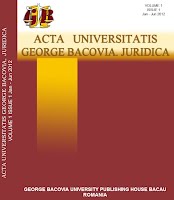Puterea autocrată a Uniunii Europene şi sursele ei
The autocratic power of the European Union and its sources
Author(s): Alexandru AmititeloaieSubject(s): Law, Constitution, Jurisprudence
Published by: Editura Universităţii George Bacovia din Bacău România
Keywords: democracy; state of law; federation; people; nation; public power; legitimacy; ratification; sovereignty; independence; autonomy
Summary/Abstract: The European Union has known a lengthy process of integration, being nowadays in fact an international atypical construction. Even though one does not yet admit that it is in fact a federation, saying instead that it tends towards a federation of nation-states, based on some recent declarations of Jose Manuel Barroso, nonetheless having in view its latest functioning mechanism, it can no longer be considered anything else but a federation. However, from a democratic perspective, one wonders whether such a construction is ratified by the European nations and whether their will is indeed taken seriously by the bureaucratic apparatus in Brussels, whose legitimacy is unfortunately ignored. At the same time one may wonder what the basis of the power of this apparatus is and who mandated it to decide in issues regarding the governing of all states composing the European Union. Leaving aside the stereotypical clichés regarding the democratic principles and rules of managing public affairs, one may still notice that the European bureaucratic apparatus functions independently from the will of the nations and most of the time even against their interests. Even more serious is the fact that nowadays nations can no longer oppose to the decisions adopted by this system.
Journal: Acta Universitatis George Bacovia. Juridica
- Issue Year: I/2012
- Issue No: 2
- Page Range: 217-241
- Page Count: 25
- Language: English

